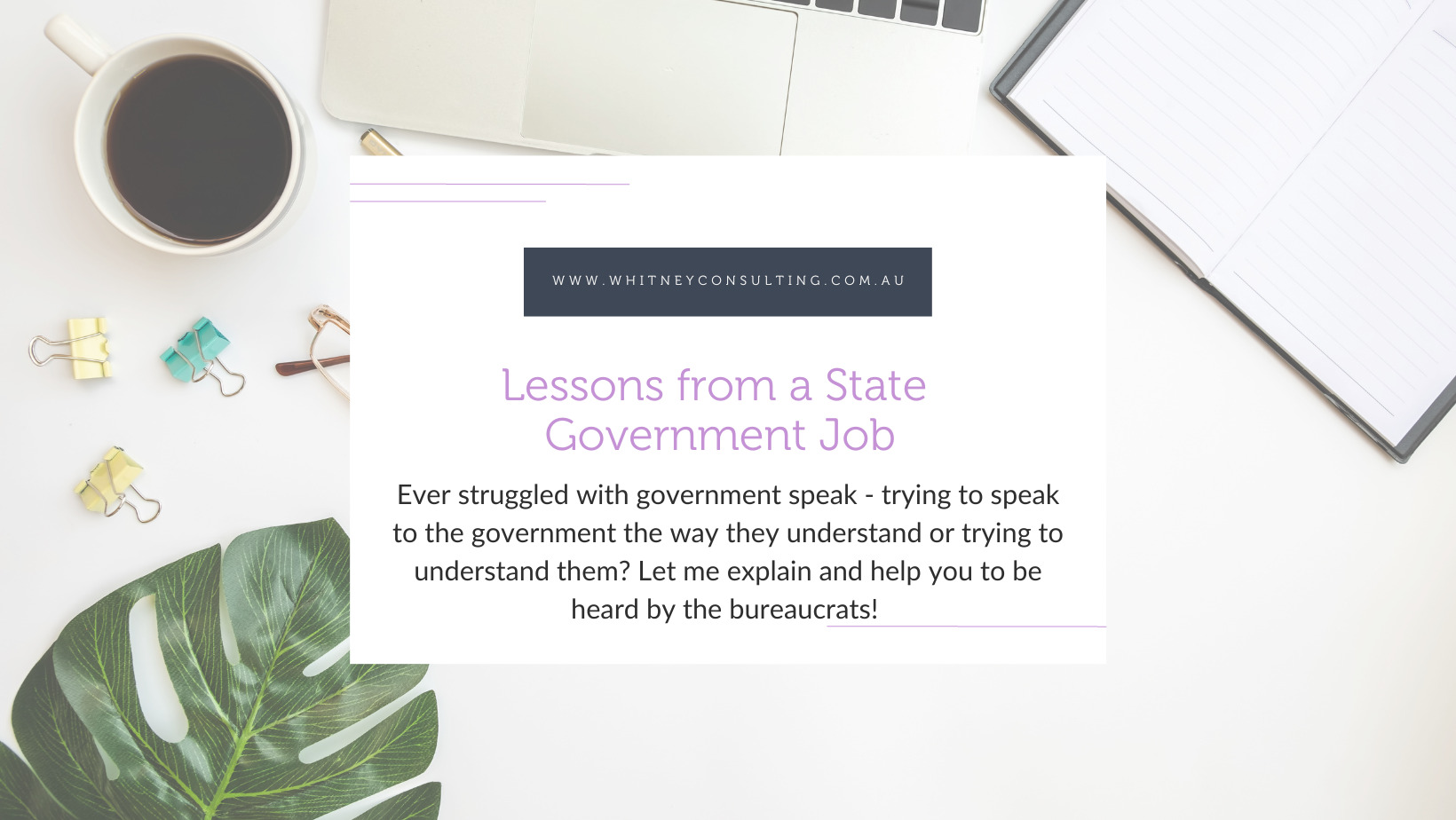During my career I have worked for Federal, State and Local Government. I spent the longest time in State Government, which is why this article is focused on State, but many of these lessons apply to all levels of government, to varying degrees.
As with all jobs and all organisations, there are positives and negatives in working for government. The need for everything to be open, transparent and to offer equal opportunities certainly helps to weed out some unscrupulous behaviour but it can also result in that behaviour simply going ‘underground’ and being better hidden. It also means that many tasks become overly bureaucratic, cumbersome and take an extremely long time to see an outcome.
A good example of this is the grants process. Government grant programs typically take around 3 months from the date they close before an outcome is known. This is due to the need to assess all grants in the same way, conduct due diligence investigations into organisations and receive sign off from all levels of management to ensure there are no embarrassing errors. When I say ‘all levels of management’, in State Government Job this means the Manager, then the Director, through to the Director General and finally up to the Minister (via the Minister’s advisors, of course). Once they all agree on the outcome, the timing of the announcement needs to be considered and then the with the Department’s communications team to deliver the announcement and any associated media statements or photo opportunities. The actual assessment of the grant application in this process is usually the task that takes the least amount of time.
However, State Government does teach its employees some very worthwhile skills, for which I am very grateful. The most important to me has been the ability to write in ‘Government Speak’. What I mean by this is that state government has a particular way of writing its Briefing Notes, Memos, Cabinet Submissions and other numerous documents that its employees need to know in order to achieve anything. Any written communication to and within government needs to meet a few criteria to be effective. It must be concise, persuasive and it must be tailored to the political climate it is written in.
The reasons behind this are;
- Every person in government has to read a LOT of documents. This is never as true as it is for Director Generals and Ministers. They get a lot of papers across their desks. You have a minute or two to grab their attention, get your point across and get a decision. Unless it is a particularly important topic (important to the Minister, not to anyone else) make it a page, maybe two pages or don’t bother.
- Ministers are experts in politics, Director Generals are experts in management/politics. They do have other experience of course, but it is often the case that one, or both of them have no particular expertise in the area that your document is about. As the person working intimately on that topic, you are the expert and you need to persuade your management and your Minister to take the course of action you recommend. At times you are trying to persuade them to take the ‘right’ course rather than the ‘political’ course, which requires some serious skill!
- Expanding on the last point, if you submit something to the Minister that is so far out of touch with the political climate, then you are wasting your time. Understanding the strategic direction the Minister has chosen and the politics of the time allows you to tailor your submission to highlight how it aligns with the Minister and downplay any ways it does not.
In addition to the ability to write things in ‘Government Speak’, working for State Government Job taught me how to look at things from government’s point of view in terms of transparency, fairness, risk mitigation and politics. Government does not look at things the same way as businesses do for two reasons. The first is that they are spending public money so they are accountable to the public and the second is that they are not solely focused on making a profit. Therefore, when government partners with any non-government organisation, whether by delivering a project with them or funding them, there are a few areas they must address before entering into the partnership.
In summary, these are;
Transparency and Fairness
Has the process for choosing a partner been clear and open? Unlike in business, government can’t just fund a project because it is a good project (well, they can, but they shouldn’t and it is bad politics!). They must consider whether they would be giving an unfair advantage to that organisation. They need to look at whether every other business or organisation had the same opportunity to become a partner and if the decision was based on merit. Government can’t be seen to be assisting and growing one organisation to the detriment of others, unless the other organisations were assessed as not as worthy for some reason.
Risk Mitigation
Government must conduct its due diligence to ensure that the organisations or individuals it works with are above-board and to minimise the chances of something going wrong. It is public money they are spending so they need to go through a lot of bureaucratic processes to make sure it is being spent cautiously and wisely. This means they need to see that the organisation has strict governance and processes in place and that it has a proven track record.
How it looks
I am conscious that the above points paint a very idealistic view. This is how government should act, not necessarily how it always does act. But this is how government officers are trained and predominantly how they are expected to behave. The last point that government considers before entering into a partnership is an unfortunate reality and it is how things look to the public. There may have been a perfectly independent, open and transparent process which chose a certain business for government to partner with and that business is owned by the Minister’s daughter. It does not matter what anyone says, that does not look good and no-one will believe the process was fair. Plus, opposing politicians would have a field day. This is an extreme example but demonstrates the less easy to grasp concept of “How it looks” being something that is considered by senior management and Ministers within government.
Many organisations I work with find government difficult to deal with, their processes overly involved and hard to follow and don’t know how to ‘talk the talk’. Knowing how to engage with government is absolutely key to attracting funding, obtaining business and getting things done. I hope this article has given you some food for thought on the topic. However, if you are still struggling to get your point across and need someone to translate your idea into Government Speak, send me an email or give me a call. More than happy to put my government experience to good use.






